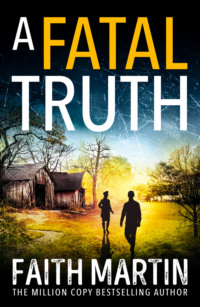
Полная версия
Clement nodded. ‘She said at the inquest that Gisela didn’t like taking her pills and often lied about having taken them when, in fact, she hadn’t?’
‘Oh, yes, that was quite true,’ Julie confirmed at once. ‘We’d all seen her do that. They numbed her feelings, you see, and Gisela did love to feel things. She said people who felt nothing weren’t really alive.’
So her mother hadn’t lied about that at least, Trudy thought, glancing across at the coroner thoughtfully.
‘And Mrs Fleet-Wright also said that sometimes Gisela would make herself sick after taking the pills?’ he mused casually.
Julie sighed. ‘I wouldn’t be surprised. It was the sort of thing Gisela would do and think she was being clever. She could be awfully sly, you see. When she didn’t get her own way.’
Trudy nodded. It was just as she’d thought. Gisela had been the kind of girl who brought nothing but chaos to herself and everyone around her. The question was – had her legacy somehow reached out and engulfed Jonathan McGillicuddy, nearly five years after her death?
And with the best will in the world – and notwithstanding her growing respect for Dr Clement Ryder and his opinions – she just couldn’t see how it could have.
It was getting dark by the time they’d talked to another of Gisela’s friends from that time, Mandy Gibson, a woman who’d since gone on to work for the BBC in London. And she’d done little more than confirm Julie Wye’s own assessment of the dead girl.
Clement had surprised Trudy by asking Mandy if she had kept any keepsakes of their friendship, such as a letter from the dead girl, or a birthday card perhaps. Mandy had looked nonplussed for a moment, but then remembered she’d kept a postcard Gisela had sent her from a holiday she’d once taken with her family in Italy.
Promising he’d get it back to her in due course, Clement had pocketed it. Trudy had meant to ask him why he’d wanted it on the drive back to Oxford, but somehow it had slipped her mind.
Now, as the coroner brought his Aunty Rover to a stop outside St Aldates station, Trudy picked up her cap from the back seat and set it firmly on her head. But before opening the door and going inside to write up her first day’s report for DI Jennings, she hesitated and turned towards the older man.
‘You think she killed herself, don’t you? Gisela?’ she challenged him flatly. ‘And that her mother covered it up?’
‘It’s a possibility, don’t you think?’ Clement asked mildly.
‘It certainly makes sense.’ Trudy decided to press him. ‘That’s what you’ve been angling for all along, isn’t it? With the family being Catholic, suicide is an even bigger social and religious no-no for them, which gives them even more of a motive to try and hush it all up. They’d not only have had to go through the scandal of having a child take her own life, but also have had to face the trauma of not being allowed to bury her in consecrated ground.’
‘So you don’t think it was death by misadventure any more then?’ Clement challenged her right back, his voice sounding amused now. ‘And after only one day too?’ He smiled in the pale light from one of the streetlamps. ‘And here was I, thinking it might take you a week or so to come around to my way of thinking.’
Trudy gave a small, irritated grunt and got out of the car. ‘I’ll see you tomorrow, Dr Ryder,’ she said stiffly.
‘Looking forward to it, Constable Loveday.’ His laconic voice followed her out into the darkening street, and Trudy slammed the car door shut behind her much harder than was probably necessary.
With a slight and annoying flush rising to her cheeks, Trudy marched firmly into the station.
CHAPTER SEVENTEEN
Anthony Deering didn’t realise anything was wrong for quite some time.
He’d slept in late that morning, rising at just gone half past nine when normally he’d have been up and about for two hours or more. But lately he’d had trouble sleeping – which didn’t surprise him much.
When his father had first told him about the letters threatening his life, he’d been inclined to laugh them off. Clearly they were the work of some feeble-minded individual who got his jollies putting the wind up people. And you simply couldn’t go around giving credence to people like that – they’d just make your life a misery if you let them. Besides, he was a fit and able young chap and had even done a bit of boxing back in his schooldays. So if anyone tried anything with him, he was pretty confident he’d be able to give a good account of himself.
But then Jonathan McGillicuddy had died – the brother he’d never known he had – and suddenly it was no joke. He no longer felt quite so confident. It was an eerie feeling, knowing that someone, who had already killed once, now had you in their sights as their next victim.
Life felt distinctly tenuous whenever he thought of his half-brother, another fit and healthy young man like himself, lying dead in a morgue somewhere. Going around with a perpetual cold itch down your back, imagining you could feel someone watching you all the time, was bound to wear you down. As was jumping at every sudden sound, and checking all the time that doors and windows were shut and locked.
Reluctant though he was to admit it, his nerves were definitely beginning to fray, as were those of his parents. So much so that it had now got to the point where the atmosphere at the house was becoming unbearable.
So, that morning, once he’d had breakfast, he’d decided he simply had to get out, if only for an hour or so. Using the excuse that he needed to go into Oxford in search of a new pair of wellingtons to replace his old pair, which were starting to let in water, he left the house with a determined step.
Though it wasn’t possible for the police to keep a man permanently stationed at the house, Sergeant O’Grady, a sound and practical man, had given them all tips on how to keep the house secure, and measures they could take to maximise their personal safety. As Anthony left the house, he was sure to check there was no one around.
His car, a Vauxhall PA Velox, was parked around the back, near the stable block. He’d liked the look of the car the moment he’d first set eyes on it. With its acres of chrome, tailfin and ‘wraparound’ front screen painted a cherry red with white trim, it appealed to something flamboyant in his nature that he was usually at pains to keep hidden.
A lot of his friends scoffed at it in public, but he suspected that, in private, they secretly wished they’d had the guts to buy something like it for themselves.
Mindful of O’Grady’s advice (and feeling slightly foolish), Anthony quickly bent down and checked underneath the car, but could see nothing suspicious taped to the undercarriage, after which he took a quick look under the bonnet. Not that he could really bring himself to believe someone would plant a bomb under his car!
As he slipped inside, the big, comfortable bench seat enveloped him in familiar comfort and he gave a small sigh of satisfaction. The dashboard of the car was as flashy as a jukebox and, when he turned the key in the ignition, he smiled in satisfaction as the six-cylinder engine roared in response.
Taking the car out on the open road was always a joy. What did he care if his friends all said it made him look as if he belonged to the ranks of salesmen who liked to thrash up and down the roads?
Today, something glitzy, vulgar and fun was just what he needed to lift his spirits and remind him that life was for the living! He was damned if he was going to go around like a whipped dog, shaking like a jelly!
He tuned the radio to the nearest station and heard Connie Francis, one of his favourites, singing her big hit from last year, ‘Where the Boys Are’, and began to sing softly along as he drove down the gravelled drive. At the end, he turned off onto the narrow country lane and headed for the B-road that would take him towards Kidlington.
For the first part of the short drive towards Oxford, everything seemed fine. Connie Francis had been replaced by Emile Ford and the Checkmates, and even the sky looked as if it might brighten up. And then, as he approached a curve in the road and put his foot down on the brake, suddenly everything wasn’t fine at all.
The brake pedal went down, but nothing much happened. Quickly he took his foot off it and stomped down again. And again nothing happened. The car didn’t even start to slow down. Abruptly he broke out in a cold sweat as he felt his heart rate start to soar.
He was travelling at over fifty miles an hour, and in a moment of total, almost calm, clarity, knew he wasn’t going to make the sharp bend that was just coming up.
Praying that nothing was coming his way on the other side of the road, he began to feverishly go through the motions he remembered from the days when he’d taken driving lessons, on how to slow a car down in case of brake failure.
Go down the gears. Turn off the engine. Put on the handbrake. But now he had to turn into the curve, and almost at once he could feel the big, heavy car start to fishtail out of control on the wet and greasy road. And then the world became a kaleidoscope of green and brown as a hawthorn hedge rose up in front of the windscreen, blocking out his view of the sky. His world darkened in a shattered kaleidoscope of glass and sound.
DI Jennings walked into the interview room of St Aldates police station and nodded amiably at the man seated at the table.
Clive Greaves had declined to bring a solicitor along with him when he’d been asked to come down ‘for an informal chat’ and Jennings intended to make the most of that while it lasted.
With a brief smile he sat down and asked the fifty-two-year-old gamekeeper if he’d like a cup of tea. Balding and built like a former rugby player, the man watched Jennings cautiously. He had deep-set, rather bear-like eyes that glared out at the world from the startling ruin of his scarred face.
‘Sure. Milk, two sugars, please,’ he finally muttered.
Jennings nodded to the young PC who’d been standing in one corner and the lad left without a word.
‘So, Mr Greaves, I have just a few questions I’d like to put to you, if you don’t mind?’ the DI began casually, reaching into his jacket pocket and producing a pack of Player’s cigarettes. ‘Fag?’
‘I prefer Piccadilly.’
Jennings shrugged, produced a lighter and set about enjoying his fourth cigarette of the day. ‘Suit yourself,’ he said mildly through the slight haze of smoke.
‘So what’s this all about then?’ Clive Greaves finally asked flatly, glancing at his watch. ‘I need to get back. I’ve got pheasants to feed.’
Jennings nodded. He knew from the papers his team had put together that Greaves had worked as a gamekeeper on an estate near the village of Aynho for nearly eight years now. Unmarried, he lived in a tied cottage, and was known to be a bit of a drinker. The station house over at Deddington knew of him, and had sent over some details. Five times they’d had to pull him out of pubs for causing an affray. Once, he’d been on the point of being charged with causing bodily harm after getting into a rather messy brawl in which someone’s nose had been broken, but, after sobering up, the plaintiff had decided not to go ahead with a court case.
But it wasn’t Clive Greaves’s temper while under the influence of alcohol that was of interest to Jennings.
‘We won’t keep you long, Mr Greaves,’ he said now, smoothly. ‘Like I said, we just need to clear a few things up. You are Mr Clive Randolf Greaves, aged fifty-two, formerly a resident of Perry Common in Birmingham?’
Clive’s eyes suddenly narrowed, which had the effect of making his features look even more misshapen and disfigured. And Jennings was already finding it hard to look at his suspect properly, since his eyes couldn’t quite make up their mind where they should alight. The gamekeeper’s whole face had the tight, shiny, red-and-white lines of a man who had been severely burned. Staring straight into his small, almost black, eyes made him feel uncomfortable – but letting his eyes stray to the other parts of his ruined features was even worse.
‘Yeah, but that’s going back a bit,’ Greaves said, giving a brief shrug. ‘I ain’t lived in Brum for years.’
‘And you’re unmarried, Mr Greaves?’
Clive Greaves snorted bitterly. ‘Whaddya think?’ he said, pointing one callused finger to his face. ‘Not exactly Errol bleeding Flynn, am I? What woman in her right mind would wanna put up with waking up next to this every mornin’?’
Which gave Jennings just the opening he was looking for. ‘Fire, wasn’t it?’ he said, trying to keep his voice casual. He made a show of checking his notes. ‘Nearly thirty years ago now. You were working in a warehouse when the goods caught fire?’
‘S’right.’
‘Says here you were hospitalised for nearly ten weeks.’
‘’Ere, what’s this got to do with anything?’ Clive suddenly demanded aggressively. ‘I thought you pulled me in to have a word about last Saturday night.’
Jennings smiled grimly. ‘No, sir. I’m not interested in the altercation you had at the Wheel and Wagon.’
‘So that jumped-up pipsqueak ain’t made a complain against me then?’
‘No, sir.’
‘So why am I here?’
‘I want to talk to you about Sir Marcus Deering,’ Jennings said softly.
And had the satisfaction of seeing his man stiffen.
CHAPTER EIGHTEEN
‘Trudy, love, don’t forget to call Brian,’ Barbara Loveday said as she neatly folded a large brown headscarf into a triangle and tied it under her chin. It was one of her favourites, with a pattern of gold, red and russet autumn leaves scattered over a cream background.
She checked her appearance in the hall mirror and glanced at her watch. With a bit of luck, she might just collect enough Green Shield stamps from her shopping today to get that toaster she had her eye on.
Trudy, who wasn’t due to meet Clement Ryder until one thirty, and had popped back home for lunch since the house was almost on her morning beat, swallowed the last of her Marmite on toast and frowned. What on earth was her mother on about now?
She stepped out into the tiny hall just as Barbara reached for the front door.
‘Brian?’ she echoed blankly.
‘See! I knew you weren’t listening to me, our Trudy! I told you this morning, Brian Bayliss called around yesterday teatime. He was dead sorry not to catch you in, but I told him you was working late. All them different shifts you have to do, our Trudy. I wish you didn’t! Anyway, he said he wanted to invite you out to the pictures. He said to tell you that that film was on that you wanted to see.’
Trudy sighed. She’d known Brian Bayliss all her life, since he lived only three doors down, was the same age as she was, and they’d gone to the same local schools. A raw, big-boned lad, he worked as a mechanic at the same bus depot where her father went each morning to pick up his beloved bus. Perhaps because of this close and constant interaction between their families, her parents (and Brian’s too, probably) had somehow got it into their heads that the two of them were a couple. Or were destined to get together, or some such nonsense.
Worse, she was beginning to think Brian thought the same.
It didn’t help that most of her friends thought he was quite a catch, since he was six-feet-three, with a fine head of sandy-red hair and unusual golden-brown eyes that had been described by one of them as ‘dreamy’. He also had a good job with a good wage. And to top it all off, he also played rugby for the local team, which made a bit of a hero out of him, apparently.
A nice enough lad, but Trudy had no intention of marrying him, or anyone else for that matter, for some time yet.
And although she’d said, over and over again, that earning her sergeant’s stripes was the only goal she had in mind, nobody ever seemed to take that in. Or take her ambitions seriously. Not her parents, or her brother, or her friends, or even Brian himself. It was as if she was one of those little dolls that, when you pulled the string, said something sweet and cute and totally unmemorable. She half-expected everyone to pat her on the head whenever she expressed her determination to succeed at her chosen career, and say how quaint she was, before going on to talk about which local girl had just got engaged. Oh, and had she thought about baby names yet for when she had little ’uns of her own?
Now, with a sigh, Trudy put on her cap and followed her mother out into the street. It was pointless arguing with her. ‘I’ll maybe call him later. If I pass a telephone box,’ she muttered instead.
‘That’ll be nice, dear. It’s Peter Sellers,’ Barbara Loveday said.
‘Huh?’ Trudy blinked.
‘In the film – the one you wanted to see. Brian said something about him being in prison and planning to steal a diamond or something,’ her mother said vaguely.
‘Oh. Right… er…I think it’s called Two-Way Stretch’, Trudy said, remembering saying once, while out with a group of friends, that she’d quite like to see the film when it came round to Oxford. Had Brian been out with them that night?
‘Well, that’ll be nice. Perhaps you can have a bite to eat afterwards. Dad says Brian earns a good screw down at the depot so he can afford to treat you.’
Trudy sighed. ‘Yes, Mum,’ she said wearily.
But as she walked into the station house, all thoughts about her social life disappeared, as it quickly became evident that something was up. There was an air of tense excitement about the place that you could have cut with a knife.
It was Rodney Broadstairs – naturally – who was the first to tell her what it was. Rodney always liked rubbing it in that he was ‘one of the boys’ and she wasn’t. ‘Our nutter’s only gone and taken a run at Anthony Deering! He’s in the hospital. Someone fiddled with his brakes,’ he told her, as he shrugged into his uniform jacket and plonked his helmet on his head. ‘The boss wants us to get out there and take witness statements.’
Trudy, trying not to grind her teeth at being left out of all the excitement, watched as Rodney set off, whistling cheerfully. Then – after a quick glance at her watch – she realised she needed to get herself down to Floyds Row pretty sharpish. She couldn’t see the old vulture taking any excuse for her being late!
She sighed heavily. Although the Fleet-Wright case had its interesting points (and was definitely better than walking the beat), it lacked the excitement and immediate drama of the Deering/McGillicuddy case.
‘I wouldn’t be at all surprised if that little brother of hers hasn’t turned out to be as batty as Gisela, poor thing.’
They were seated in a rather cramped little den, in a rather cramped little cottage, just the other side of Middleton Cheney, where Mary Allcroft was now living. Along with Mandy Gibson, Mary had been considered a contender for the role of Gisela’s ‘best friend’. Although one of the first things Mary had said to them, when they’d tracked her down and asked if it was all right if they had a chat, was that being a friend of Gisela’s was often something that could be open to interpretation.
Mary currently worked in the market town of Banbury, as a secretary in the offices of a narrowboat yard, so they’d been lucky to find her in on her afternoon off.
They’d been sipping strong, hot tea from slightly grubby mugs as Mary, after comfortably tucking her hair neatly behind one ear and settling down into an overstuffed armchair, happily answered any questions they put to her.
Which had started with her expanding on her remark about what being ‘friends’ with the dead girl actually entailed. Which was, apparently, to worship at her altar and put up with her moods.
‘Gisela was a funny thing,’ she’d explained. ‘One moment you were flavour of the month, and the next – for no fathomable reason – you were out in the cold.’
Both Trudy and Clement had agreed she sounded like hard work, but Mary had remained touchingly loyal to her dead friend. A short, round sort of girl, with an unruly cap of curly yellow hair and big blue eyes, she’d simply shrugged and told them she’d always felt sorry for her, and had been willing to put up with her ‘eccentricities’.
‘She was so clearly unhappy, you see, most of the time,’ Mary told them simply.
This had led to a general discussion about Gisela’s constant battle with depression and mood swings, which, in turn, had led to Mary’s latest comment about her little brother, Rex, being just the same way. It was almost as if she saw unhappiness like a physical trait you could inherit in your genes, along with the colour of your eyes or hair.
‘The little brother,’ Clement said now with a slight frown. ‘I don’t remember him being called at the inquest.’
‘Oh, he wouldn’t have been,’ Mary said promptly. ‘He was only a kid when Gisela died.’
‘What – five or six?’ Trudy asked. She, too, had seen no mention of the younger Fleet-Wright sibling in the records.
‘Oh, no. A bit older than that,’ Mary said. ‘Thirteen or fourteen maybe?’
Clement nodded. As a general rule, the court preferred not to call minors to the stand to testify, unless it was absolutely necessary.
‘How did they get on?’ Trudy asked, genuinely curious now. ‘I get the impression, from all I’ve been learning about her, that Gisela liked to be the centre of attention.’
‘Oh, Gisela didn’t mind him,’ Mary surprised her by saying airily. ‘Of course, she was always daddy’s little princess, and Mr Fleet-Wright doted on her. She could always twist him round her little finger.’ Mary laughed. ‘And it didn’t hurt that Rex adored his big sister either.’
Ah, Trudy thought with a wry smile. That would explain it.
‘He used to follow her around like a little puppy dog sometimes, which amused her and pandered to her ego.’ Mary paused and frowned slightly. ‘To tell you the truth, I found it a bit creepy sometimes.’
‘How so?’ Clement asked sharply.
‘Well – with boys, it’s usually all “mummy” this and “mummy” that, isn’t it?’ Mary said comfortably. ‘But with Rex, it was as if the sun and moon shone out of Gisela, not out of Beatrice. Maybe Rex picked up early on the fact that Gisela was the real focus of the family dynamic, making his mother more or less irrelevant.’
‘And Gisela’s health problems…’ Trudy chose her words very carefully. ‘Those would naturally have concerned her parents greatly, taking up all their time and anxiety.’
‘Yes, quite,’ Mary said. ‘Everyone worried about Gisela, which only played to her dramatic side.’ Mary paused and shrugged. ‘Even Rex fretted over her constantly, making sure she was warm enough, or ate her dinner. Of course, it didn’t help that Gisela used to play up to him either. I remember once, me and Mandy were round their place one summer, and Mrs Fleet-Wright had told Rex he couldn’t have a sherbet dip because it would ruin his appetite for tea. And Gisela immediately sneaked off to the local shop and bought him one and gave it to him. I wouldn’t have paid any attention to it if I’d thought she was simply being kind. But Gisela deliberately engineered things to make sure Rex was caught eating it. Naturally, that put her mother in a bind. If she took it off him, it would make Mrs Fleet-Wright the villain. And if she didn’t, it would just undermine her authority all the more.’
At this point, Trudy glanced thoughtfully at the coroner. Clearly, the Fleet-Wright family had its issues.
‘So, what happened?’ Clement asked, careful to keep his voice calm and neutral.
‘Oh, Mrs Fleet-Wright simply shook her head and said that if he didn’t eat all his tea there’d be trouble. In the event, Rex ate all the sherbet dip and seemed to adore Gisela all the more.’ Mary shook her own head now as she thought back. ‘The trouble was, Gisela was as inconsistent with Rex as she was with everyone else. One moment she’d make a proper pet of him; the next she’d be scornfully telling him to go away, that he was being a pest, and that nobody in their right mind would want him around. Rex would be heartbroken and wander off like a whipped puppy, and Gisela would just laugh.’







